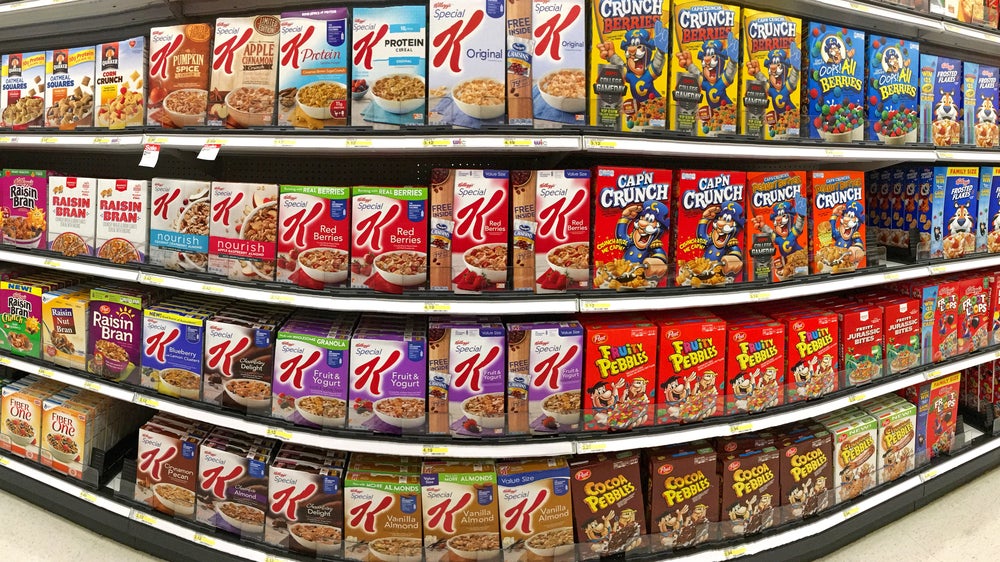
Multinational food manufacturer Kellogg has global reach through its famous brands, which include Pringles, Pop-Tarts and beloved cereal products such as Coco Pops.
With this influence in the food industry comes the responsibility of ensuring sustainable practices through Kellogg’s product packaging.

Discover B2B Marketing That Performs
Combine business intelligence and editorial excellence to reach engaged professionals across 36 leading media platforms.
Kellogg’s e-commerce channel development director Gregor Murray spoke at the Global Connected Packaging Summit about the work he does to push for innovative sustainable packaging in manufacturing.
“The food industry got into sustainability a long time ago, so it’s not a new agenda for us.
“Certainly within Kellogg, we have teams of people who are looking at ways that we can dramatically change what we’re trying to do in order to be more sustainable.”
These include an in-store recycling scheme with US-based retailer Albertsons and recyclable paper liners for its cereal boxes.

US Tariffs are shifting - will you react or anticipate?
Don’t let policy changes catch you off guard. Stay proactive with real-time data and expert analysis.
By GlobalDataMurray also highlighted industry-wide sustainable packaging initiatives, including removing non-essential plastics and reusing materials such as glass, but also the ever-present recycling challenges.
“Local authorities recycle 50 to 55% of the total amount of waste that gets thrown away, but of the remaining of your total waste, 25% of it currently cannot be recycled, or there isn’t a market for it to be recycled. That is a real issue because manufacturers are still producing hard plastics, which are really difficult to recycle.”
Pushing for innovation in sustainable manufacturing
To solve these issues, Murray emphasised the need for thinking out of the box, citing an idea he heard at a forum he held in a local school to ask children for their ideas on what manufacturers should do to help improve recycling.
“One of the best ideas I’ve ever heard was from a 14-year old who said all manufacturers should use three different sizes of packaging: a small, medium and large, which should be consistent across all manufacturers. So if you produce a box or bottle, there should be three different but consistent sizes and weights designed to fit through the supply chain. They should also be recyclable and not have loads of dead space around them, so you’re not transporting lots of air, which produces carbon.
“I’ve sat in rooms with manufacturers for years talking about sustainability initiatives, really smart, hugely well paid people. And nobody had come up with an idea of that simple. I love it and I’ve taken it to as many manufacturers as I possibly can to say we could do something really cool here, just by standardising the size of packs.”
He also addressed machinery, saying that if packaging materials could be communicated to machines, they could be sorted for recycling more efficiently and avoid going to landfill.
Murray accepted that implementing such ideas could be difficult but emphasised that manufacturers have to actively choose to make changes to their operations, which doesn’t happen overnight.
Alternative ideas for the deposit return scheme
A source of controversy in the sustainable packaging space, Murray was asked for his thoughts on the deposit return scheme.
“The benefits are obvious, and systems like this have worked for a long time through things like milk deliveries in reused glass bottles.
“But the reasons why it keeps being delayed is because firstly, the big supermarket chains don’t want to be taking back bottles, as they have nowhere to keep them. They’ve worked to have the smallest warehouses as possible so they don’t want to store empty plastic bottles.”
The other problem he highlighted was consumer behaviour: “There is no amount of money that is relevant enough for consumers that you can add to the price of a bottle that will make people want to take it.”
Murray then explained another idea that he says was put forward by soft drinks companies for the deposit return scheme, whereby bottle return stations would be put into schools and the money would go to the schools. “In my opinion this was a much better idea than the system that is currently being delayed.”
He concluded with the call for a global set of principles, which “everybody signs up to to agree on how packaging is going to get through the entire lifecycle so that it can be recycled.”





